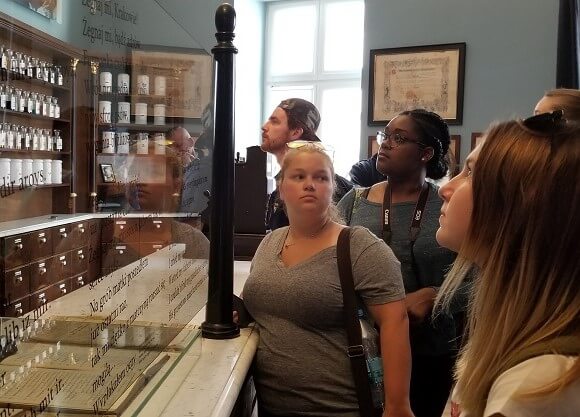
Course teaches Holocaust through film and travel
November 01, 2018

November 01, 2018

“A lot of how we understand history comes from our imagination,” said Callahan, an associate professor of interactive media and design. “Can you imagine the history? Film and travel greatly help with that.”
The course combines study of the genocide through different types of film with a 10-day trip to visit Holocaust sites. All the students had previously studied this period of history, but they came to the communications class with an interest of learning more.
“I decided to take the course because learning about the Holocaust in high school was always so over-simplified,” said history major Cynthia Clement ’19. “At the college level, I knew it would go deeper and bring in different perspectives.”
Seeing the Holocaust through a different perspective was exactly what Callahan hoped her students would do.
“What’s interesting about a class like this — with films and travel — is that it takes you from your own reality and tries to put you in another,” she said. “You start to feel what it would have been like 70 years ago.”
The students watched feature films like “Schindler’s List,” along with documentaries and even Nazi propaganda films to understand the spectrum of ways history can be portrayed through film. Traveling to Holocaust sites in Germany, Poland and the Czech Republic brought everything the students had learned to life.
“You can read about Auschwitz or even watch a movie about it, but the moment you are standing there, it’s no longer a learning experience, it’s an emotional experience,” said Callahan.
Clement echoed this emotional take when she described the class’ visit to the Wannsee House in Berlin.
“One film we watched in class, ‘The Final Solution,’ was shot entirely in the house and when we were walking down the gravel up to the house it was almost an eerie experience,” she recalled.
A visit to one of the concentration camps was the most impactful moment for psychology major Kassandra Mendes ’19.
“I will never forget the way it felt to walk through the gates all the way to the end of the train tracks in Auschwitz-Birkenau,” she explained. “To be standing in the exact same location where many people saw their loved ones and sunlight for the last time is something that will stick with me forever.”
Callahan wanted the students to not just visit these historical sites, but also reflect on their feelings.
“It was interesting hearing everyone’s feedback at the end of each day,” shared film, television & media major Karlie Hegarty ’19.
“We were all drawn in by something different, and we all reacted differently to certain things. I think that was the greatest part of the entire trip.”
Hegarty was so enthusiastic about reflections from the trip she even created a website about her and her classmates’ experiences.
Whatever reactions to the experience of the trip, students agreed it was the perfect complement to their work in the classroom.
The course will be offered again during the spring 2019 semester. All students interested in registering should contact Professor Ewa Callahan directly.
Learn more about the students' experiences
“It was amazing to be able to connect what we saw through film in class with what we were seeing with our very own eyes," said Sarah McGuire ’19. “It was truly a life-changing trip that I am so happy I was lucky enough to experience.”
Quinnipiac Today is your source for what's happening throughout #BobcatNation. Sign up for our weekly email newsletter to be among the first to know about news, events and members of our Bobcat family who are making a positive difference in our world.
Sign Up Now